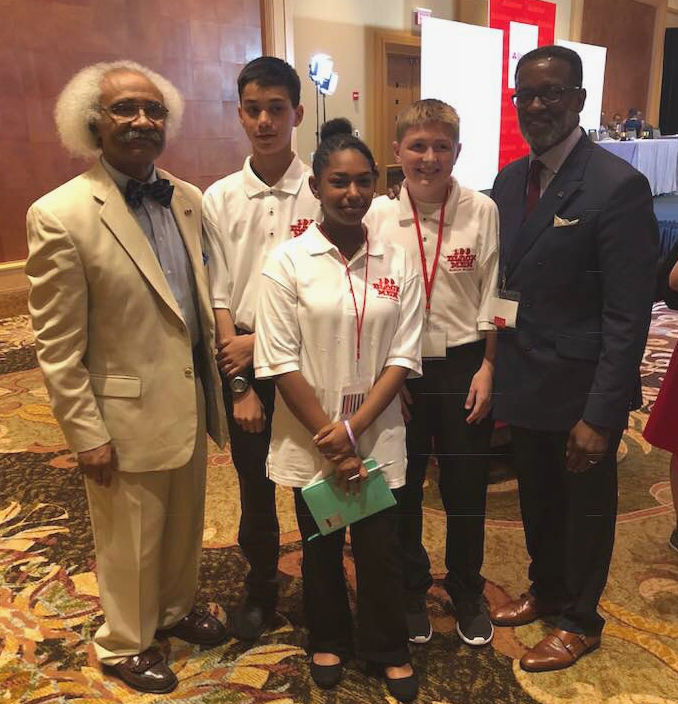For the second year in a row, a Madison middle school is a national champion.
Spring Harbor Middle School won the national competition for the African American History Challenge Bowl at the 100 Black Men of America, Inc. 32nd Annual International Conference and National Competition on June 16, in Hollywood, Florida.
Wright Middle School from Madison won the national championship last year in New Orleans. Spring Harbor’s latest victory makes it 6 national championships in the last 24 years for middle schools from Madison. Spring Harbor Middle School’s championship team is made up of Paul Eickhoff, Simon Kellum and Genesis Woodards.
Are the rest of the 100 Black Men chapters around the United States getting tired of Madison coming?
“Oh, yeah. I think they are,” laughs 100 Black Men of Madison’s Enis Ragland, who has been involved with the Challenge Bowl since its inception. “We have to give credit to these young people. These kids had their study material with them everywhere they went – when they went to the beach, when we went to eat. They were always studying. They were on it. I think they missed one question because they didn’t give a complete answer, but other than that, I think they were pretty much on it.”
The African American History Challenge Bowl is an annual contest for middle school students in a quiz show format where students are quizzed on questions from a prominent African-American history book. The Spring Harbor students earned the right to represent Madison at the national conference with a victory at the citywide competition back in April.
This African American History Challenge Bowl national competition wasn’t even particularly close with Spring Harbor breezing through the preliminary rounds before crushing a team from the 100 Black Men chapter in Omaha, Nebraska, by a score of 50-20 in the finals.
“It was a great experience for them. I’m very proud of them,” Ragland says. “Beyond the actual competition, they did do some social things and some workshops and had fun and got to meet a lot of people. They had a good time and enjoyed themselves.

“It was a great group of kids and it was a pleasure to be around them. All three of the students are really sharp in math and Simon [Kellum] is 29th in the world in the speed of solving the Rubik’s Cube,” Ragland adds. “He had that thing with him and he can solve it blindfolded because there’s a math algorithm you learn. He was fascinating people at the conference.”
The 100 Black Men of America, Inc., (sometimes simply referred to as ‘The 100’) works to improve the quality of life for communities throughout the United States. Mentoring is the core service delivery of The 100, the largest network of African-American male mentors in the nation. They work to influence and transform the lives of underrepresented and disenfranchised youth, with a focus on African-American youth.

The Annual International Conference and National Competition was a chance to connect with 100 Black Men branches from all over the United States. At the event, the kids got a chance to meet former Heisman Trophy winner Johnny Rodgers and civil rights icon Dr. C.T. Vivian. Emmanuel Lewis, an actor best known for playing the title character in the 1980s television sitcom “Webster,” was the emcee of the event.
“I don’t think the kids really knew who Emmanuel Lewis was, but I was loving him,” Ragland smiles. “I got a chance to chat with him and take a photo with him. He was a really nice guy.”
The goal of 100 Black Men of Madison with the African American History Challenge Bowl is for students to learn more about African-American history. Another national championship is just icing on the cake.
“We say that everybody needs to understand and learn our history. It’s one history … history is intertwined. We are part of America. The fact that these kids want to learn African-American history and are really excelling at it is very rewarding for us,” Ragland says. “It means that we’re doing what we wanted to do decades ago when we first decided to have a citywide competition open to all of our kids.”




























